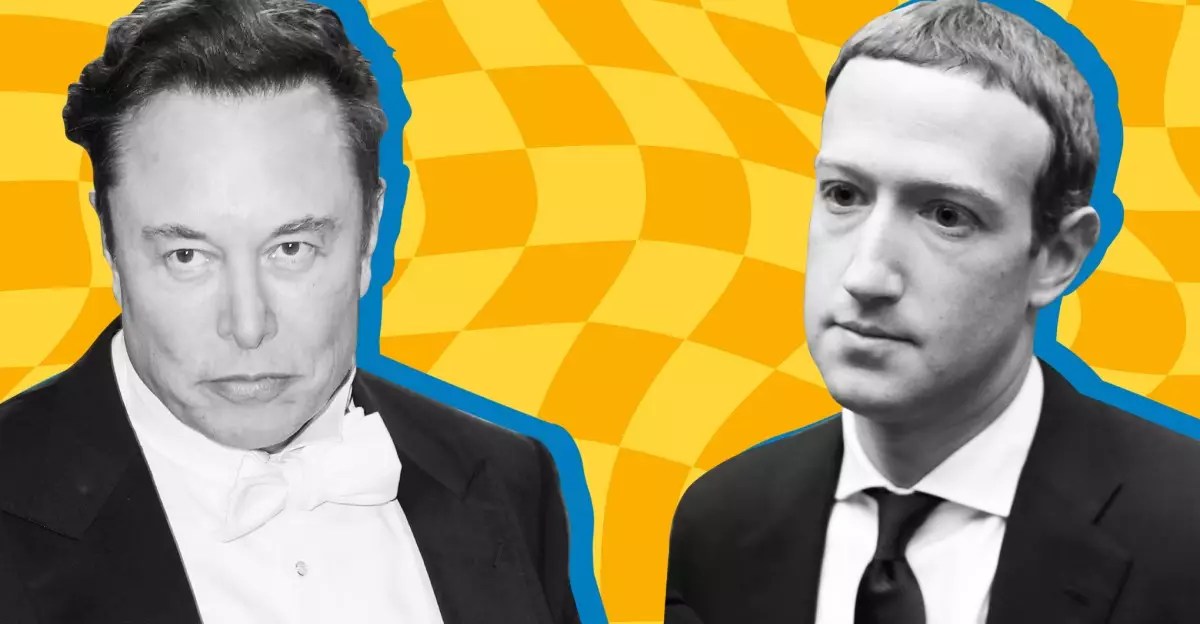In a bizarre intersection of technology, satire, and social commentary, crosswalk buttons in several California cities have recently been hijacked to broadcast imitation voices of high-profile figures like Elon Musk and Mark Zuckerberg. This peculiar event raises thought-provoking questions about the boundaries of artificial intelligence and the social narratives couching our perception of these influential tech magnates. As voices that parody the CEOs beg for friendship or mock their larger-than-life personas, the act of turning a safety feature into an entertainment device dramatically highlights the complex relationship between technology, identity, and public perception.
The sheer absurdity of these AI-enhanced crosswalks cannot go unnoticed. It’s not just a simple glitch; it’s a performance—a strange critique embedded in the very fabric of mobility within Silicon Valley. The altered buttons no longer provide pedestrian guidance solely for the visually impaired; they’ve transformed into a candid platform, offering a hilarious yet pointed commentary on how these tech figures operate within the public domain. This blend of satire and technology offers a refreshing lens through which to examine cultural attitudes towards figures like Musk and Zuckerberg who are often untouchable in their spheres of influence.
Public Reaction: Laughter Meets Critique
Reactions to the phenomenon have been mixed but ultimately gravitated toward humor and incredulity. Musk’s voice, imploring passersby to “be friends,” and Zuckerberg’s acknowledgement of bad practices wrapped in increasingly comical language resonate with many. People enjoy the entertainment value but should brace themselves for the implications lurking beneath the surface. The jokes about “undermining democracy” and “cooking our grandparents’ brains” unearth deeper societal concerns about the influence and ethics surrounding the tech industry—the very industry shaping how we engage with one another, both online and offline.
The notion that these playful jabs are being broadcast through a medium designed to promote safety adds another layer of complexity. While the intentions may not have been harmful, should we laugh it off, or does it reveal a darker truth about how we perceive these figures? In a world where public figures can emerge practically unscathed from scandals, observing them being subjected to mockery in such a public way offers a catharsis that many might not have realized they needed—an escape from the prolonged seriousness surrounding their empire-building activities.
The Ethics of AI and Public Humiliation
This incident also compels us to reflect on the ethical implications of AI and how it operates within society. While the crosswalks’ creators likely never envisioned their technology being used for mockery, the reality is that we live in an age where the line between legitimate application and parody becomes blurred. As artificial intelligence advances, it raises an alarming yet fascinating question: how far is too far when it comes to utilizing these technologies? The playful personas of Musk and Zuckerberg can mask the potential dangers lurking behind the misuse of AI technology.
Moreover, the irony of using an accessibility feature to lampoon its very creators signals a shift in how we view power dynamics in technology. There’s a unique sense of agency exhibited by those who commandeer tech for comedic effect, flipping the narrative back onto the powerful. However, one must ponder whether this creates a greater sense of despair or a movement towards accountability. In a landscape where tech behavior often contradicts public interest, perhaps a comedic reflection signifies a form of protest, however unorthodox it may be.
The Future of AI in Public Spaces
Ultimately, this AI-distorted display raises critical conversations about the relationship between modern technology and public engagement. The absurd remarks made in the jest of a button could be signifying the beginning of a trend where digital personas enact real-world consequences. It suggests a future where technology serves not only functional roles but also reflect societal critiques, maintaining a pulse on the ever-complex interplay of personality, power, and public discourse.
As we witness this peculiar blend of public satire unfold on the streets of California, one can forget, if only momentarily, the seriousness of our societal challenges. However, it begs the question: to what extent do we desire or accept such manifestations of technology in our everyday lives? The voices of Silicon Valley luminaries ringing through our pedestrian paths serve as a reminder that the significance of technology is not solely rooted in its capabilities but also in how it interacts with our cultural narrative, often unveiling truths that go unnoticed in the hustle of daily life.


Leave a Reply